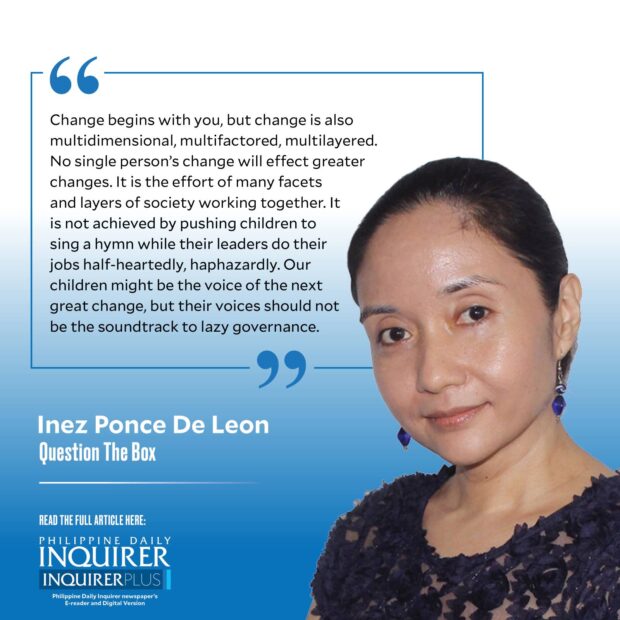
A quote attributed to Mahatma Gandhi is working overtime in policy, speeches, and enforced nationalism these days: “Be the change you wish to see in the world.”
It’s a standard scolding to anyone who excessively relies on an external power for change, be it a teacher, parents, or one’s government. The actual phrase from Gandhi, however, is neither as simple nor as short.
“As a man changes his own nature, so does the attitude of the world change towards him. We need not wait to see what others do.”
The spirit of this quote is far more nuanced than telling people to change themselves. The idea of pushing for individual change, after all, can easily be abused by anyone in power, and can easily be harnessed by anyone who wants to do things without accountability.
A current example: When children are made to sing hymns or make pledges about their responsibility to their country’s progress and prosperity by giving all their talents and time to serving the country—while reminding themselves that they have to participate in government because the work of citizenship is not the work of a few.
Noble, except that they have to sing this while a Senate hall is being built at exorbitant prices; politicians hang out at parties and negotiate who gets to drink what and when while fumbling over hearings in aid of legislation; law enforcement can’t get its act together to capture a sex offender; and our fishermen and soldiers can’t even sail in our waters because of supposed secret deals with China that should, but haven’t been investigated and properly persecuted.
What exactly are our children being made to sing to? What are they being forced to sing about?
Let’s make the actual Gandhi quote more literal: Change who you are, and the world will see you differently. Don’t wait to see what other people will do.It is clear that we are being called to change our nature—but the latter parts of the quote also say that change is fruitful only if it also results in a change in the world surrounding a person. While great things can start with individuals, the actual change has to result in the infrastructure changing—the actual change is a cooperation between the citizen and those in power.
The quote is actually closer to: Be firm about what you want and don’t wait for someone else to start acting. The world will see you differently if you act beyond your comfort zone. The change happens once greater structural changes work with your individual change.
The assurance of structural change shouldn’t stop us from doing good things. We still need to throw trash in the proper places, work on saving and conserving our natural resources, educate ourselves, vote for leaders who inspire us to be actual citizens. We need to do these small things, but they have to also prompt change at higher levels of government, or our individual actions will mean little.
“Be the change you wish to see in the world” makes citizenship an individual responsibility, but this also removes the role that one’s surroundings play. Real change can occur only when both individuals and their surrounding structures work together.
Throw trash in the proper places? Sure. But government also has to ensure that our trash goes somewhere and we have larger policies in place to enforce and encourage a sustainable lifestyle at all levels of society. Avoid the use of plastics? Sure. But our manufacturing companies also have to change how they produce packaging. Save and conserve our natural resources? Sure. But the government also needs to enforce who we allow to fish in our waters, use our land resources, and reforest our islands.
Vote for good leaders? Definitely. But this means that we have to vote for senators who actually enact laws and investigate in aid of legislation, not those who walk in the shadow of the president’s family, or those who appear only for photo-ops. We have to vote for congresspersons who know how to craft legislation, debate on policy, and propose programs, not those who simply applaud everything the administration does. We have to vote for a barangay council that listens to the people while striving to improve the context in which their people live.
Speak up against the incursions of China in the West Philippine Sea? Yes, we have to be firm, and we need to go beyond simply laughing at memes that criticize wayward government officials. We have to stand rather than cower when we’re accused of being disruptive. But the government also has to act.
Change begins with you, but change is also multidimensional, multifactored, multilayered. No single person’s change will effect greater changes. It is the effort of many facets and layers of society working together. It is not achieved by pushing children to sing a hymn while their leaders do their jobs half-heartedly, haphazardly.
Our children might be the voice of the next great change, but their voices should not be the soundtrack to lazy governance.
iponcedeleon@ateneo.edu